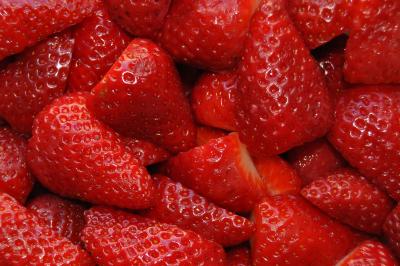Strawberries lower cholesterol

The consumption of strawberries lowered levels of bad cholesterol and triglycerides in an experiment with volunteers. Credit: SINC
At the end of this unusual treatment, their levels of bad cholesterol and triglycerides reduced significantly, according to the analyses conducted by Italian and Spanish scientists.
Several studies had already demonstrated the antioxidant capacity of strawberries, but now researchers from the Università Politecnica delle Marche (UNIVPM, Italy), together with colleagues from the Universities of Salamanca, Granada and Seville (Spain), conducted an analysis that revealed that these fruits also help to reduce cholesterol. The team set up an experiment in which they added 500 g of strawberries to the daily diets of 23 healthy volunteers over a month. They took blood samples before and after this period to compare data.
The results, which are published in the Journal of Nutritional Biochemistry, show that the total amount of cholesterol, the levels of low-density lipoproteins (LDL or bad cholesterol) and the quantity of triglycerides fell to 8.78%, 13.72% and 20.8% respectively. The high-density lipoprotein (HDL or good cholesterol) remained unchanged.
Eating strawberries also improved other parameters such as the general plasma lipid profile, antioxidant biomarkers (such as vitamin C or oxygen radical absorbance capacity), antihemolytic defences and platelet function. All parameters returned to their initial values 15 days after abandoning 'treatment' with strawberries.
As Maurizio Battino, researcher at UNIVPM and Director of the study, tells SINC: “This is the first time a study has been published that supports the protective role of the bioactive compounds in strawberries in tackling recognised markers and risk factors for cardiovascular diseases.”
The researcher admits that there is still no direct evidence about which compounds of this fruit are behind their beneficial effects, “but all the signs and epidemiological studies point towards anthocyanins, the vegetable pigments that afford them their red colour.”
The research team confirmed in other studies that eating strawberries also protects against ultraviolet radiation, reduces the damage that alcohol can have on the gastric mucosa, strengthens erythrocytes, or red blood cells, and improves the antioxidant capacity of the blood.
In fact, this year they will publish another study in the journal Food Chemistry in which they will demonstrate that consuming strawberries increases the antioxidant function of blood flow, erythrocytes and mononuclear cells.
References:
José M. Alvarez-Suarez, Francesca Giampieri, Sara Tulipani, Tiziana Casoli, Giuseppina Di Stefano, Ana M. González-Paramás, Celestino Santos-Buelga, Franco Busco, Josè L. Quiles, Mario D. Cordero, Stefano Bompadre, Bruno Mezzetti, Maurizio Battino. “One-month strawberry-rich anthocyanin supplementation ameliorates cardiovascular risk, oxidative stress markers and platelet activation in humans”. Journal of Nutritional Biochemistry 25 (3): 289-294, marzo de 2014.
Sara Tulipani, Tatiana Armeni, Francesca Giampieri, José M. Alvarez-Suarez, Ana M. Gonzalez-Paramás, Celestino Santos-Buelga, Franco Busco, Giovanni Principato, Stefano Bompadre, José L. Quiles, Bruno Mezzetti, Maurizio Battino. “Strawberry intake increases blood fluid, erythrocyte and mononuclear cell defenses against oxidative challenge”. Food Chemistry 156: 87-93, agosto de 2014
Media Contact
All latest news from the category: Studies and Analyses
innovations-report maintains a wealth of in-depth studies and analyses from a variety of subject areas including business and finance, medicine and pharmacology, ecology and the environment, energy, communications and media, transportation, work, family and leisure.
Newest articles

Magnetic tornado is stirring up the haze at Jupiter’s poles
Unusual magnetically driven vortices may be generating Earth-size concentrations of hydrocarbon haze. While Jupiter’s Great Red Spot has been a constant feature of the planet for centuries, University of California,…

Cause of common cancer immunotherapy side effect s
New insights into how checkpoint inhibitors affect the immune system could improve cancer treatment. A multinational collaboration co-led by the Garvan Institute of Medical Research has uncovered a potential explanation…

New tool makes quick health, environmental monitoring possible
University of Wisconsin–Madison biochemists have developed a new, efficient method that may give first responders, environmental monitoring groups, or even you, the ability to quickly detect harmful and health-relevant substances…



